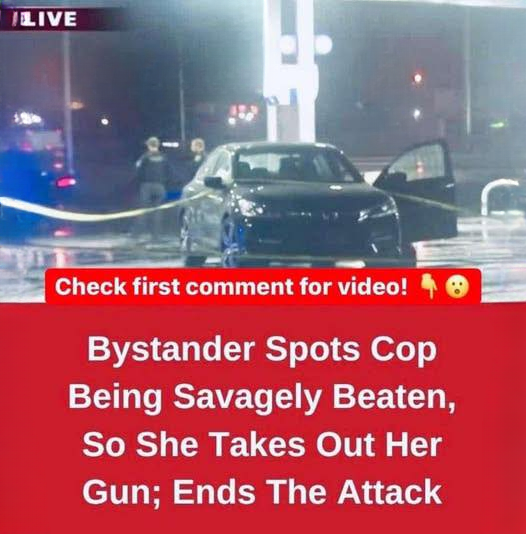Sergeant Randy Harkness had spent more than twenty years serving Dawson County, Georgia. People knew him for his compassion — the kind of officer who always went out of his way to help those who had slipped through life’s cracks.
That morning felt like any other. The sky was clear, the roads quiet. While patrolling near a small gas station on the edge of town, Harkness noticed a man standing by the highway holding a cardboard sign: Hungry. Need help.
He recognized him — a homeless drifter who sometimes lingered around the area, always polite, never causing trouble.
Harkness pulled his cruiser over. “How’s it going, buddy?” he asked as he stepped out.
The man shrugged, eyes guarded. “Just hungry, sir.”
Without thinking twice, Harkness offered him a ride. “Come on. I’ll get you something to eat.”
The man climbed in gratefully. They chatted on the short drive to a nearby gas station. When they arrived, Harkness even took a few dollars out of his own pocket and handed them over before stepping out to pump gas. It was the kind of small kindness he had shown countless times before.
But this time, compassion was answered with violence.
As Harkness turned his back, the man suddenly attacked — swinging his fists with wild, furious force. The blows landed fast and hard. The sergeant, caught completely off guard, slammed against the patrol car as the man continued hitting him.
Witnesses later said it looked like the attacker snapped — rage replacing any sense of reason. Blood streaked the officer’s face as he tried to shield himself, stumbling backward, dazed.
Across the parking lot, a woman in her thirties sat in her car sipping coffee. She heard shouting, glanced up, and froze as she saw the man beating the officer. Fear punched through her, but she didn’t stay still. Instead, she reached into her glove compartment, grabbed her legally carried handgun, and ran toward them.
“Stop!” she yelled, her voice sharp enough to cut through the chaos. “Get away from him!”
The man spun toward her, eyes wild — and charged.
She fired twice. Two controlled shots. Both hit. The attacker collapsed instantly.
Silence fell over the lot except for the labored sound of Harkness’s breathing.
She ran to his side. “Officer, are you okay?” she asked, her hands trembling as she holstered her weapon.
Harkness, bruised and bleeding, nodded. “You… saved my life.”
Backup arrived within minutes. Paramedics tended to both the officer and the attacker. The man was taken to the hospital in critical condition but alive.
Word spread quickly. The woman, visibly shaken, answered the deputies’ questions honestly and calmly. She hadn’t wanted to shoot anyone. She just couldn’t stand by and watch a man be beaten to death.
Sheriff Jeff Johnson later confirmed what everyone already believed: she had prevented a tragedy.
“She’s a hero,” he told reporters. “She stepped in without hesitation when someone’s life was on the line. That kind of courage deserves respect.”
Though standard protocol opened an investigation, officials made it clear she wasn’t expected to face any charges. Under Georgia’s self-defense laws — and basic Good Samaritan principles — she was legally protected.
In the hospital, Harkness recovered quickly. He insisted on giving a statement as soon as he could. His voice was steady despite the bruises.
“I’ve worn this badge a long time,” he said. “I know to expect the unexpected. But I never thought kindness would lead to something like this.” He paused. “That woman didn’t owe me a thing. But she acted. And because of her, I get to go home to my family.”
He asked that her name not be released. “She didn’t do it for attention,” he told reporters. “She did it because it was right.”
Over time, locals learned a little about her: a mother of two, a former service member, a quiet woman in her community. She’d gotten her carry permit not because she wanted to use her gun, but because — as she once explained to a friend — “It’s better to be prepared and never need it than the other way around.”
That day, her preparation saved a life.
News of the incident soon spread beyond Georgia. It was the rare headline that reminded people of the good still left in the world — that courage often comes from ordinary people in extraordinary moments.
Online discussions erupted about guns, self-defense, and vigilantism. But Sheriff Johnson cut through the noise with one simple statement: “This isn’t about politics. It’s about humanity — someone choosing to act when another person was in danger.”
Harkness returned to duty several weeks later. When asked if the event changed how he viewed the community, he said, “I’ve always believed most people are good. That day proved it.”
Months later, he met the woman privately. No cameras. No reporters. He handed her flowers and a handwritten note that read: Thank you for your courage. You didn’t just save my life — you reminded me why this job matters.
She smiled and shook her head. “You don’t owe me anything.”
“Maybe not,” he replied, “but I’ll remember you for the rest of my life.”
In a world that often feels divided, what happened in that gas station parking lot was a reminder: bravery doesn’t always wear a badge. Sometimes, it’s an ordinary person choosing, in one split second, to do something extraordinary.
